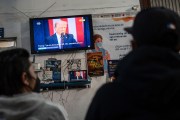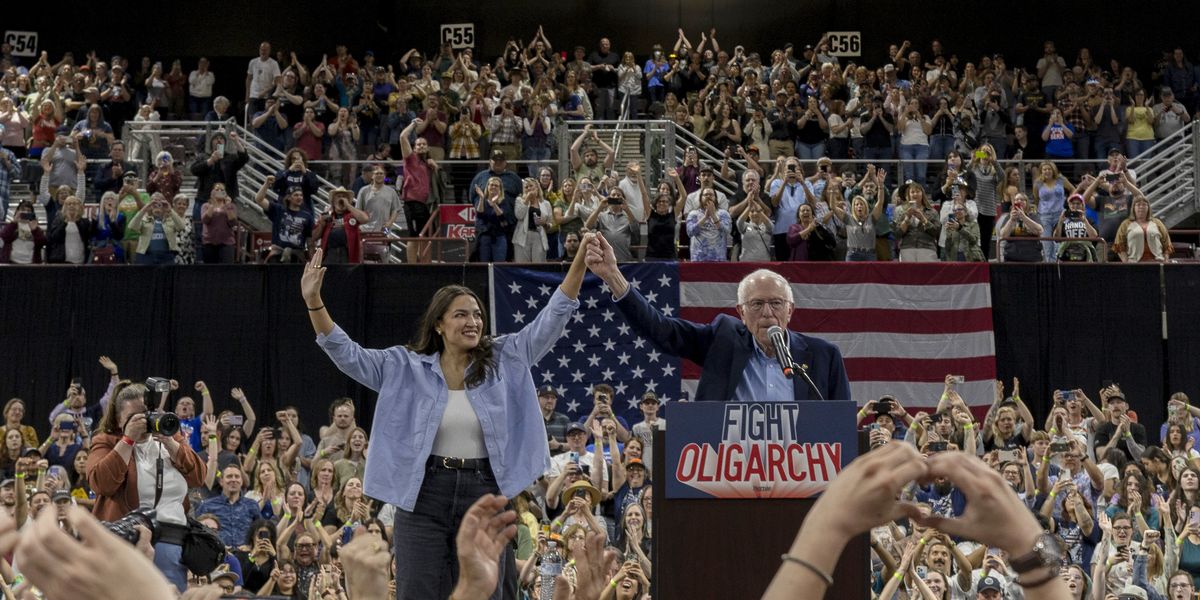
DHS shuts ‘open door’ for women and queer immigrants to report abuse, advocates say
April 15, 2025
Reuters is the latest media company to drop “diversity” language in response to Trump executive order
April 15, 2025Anyone observing the nationwide Fighting Oligarchy Tour led by Sen. Bernie Sanders and Rep. Alexandria Ocasio-Cortez has taken notice of the massive crowds that the lawmakers have drawn in a wide variety of cities—including in deep-red states like Utah and Idaho—and a poll out Monday provided new evidence that the progressive leaders’ pro-working class message is resonating across the country.
A survey taken by Harvard’s Center for American Political Studies and Harris between April 9-10 found that 72% of Democratic voters supported politicians like Sanders (I-Vt.) and Ocasio-Cortez (D-N.Y.), “who are calling on Democrats to adopt a more aggressive stance towards Trump and his administration and ‘fight harder’,” rather than leaders who are willing to “compromise” with President Donald Trump.
Just 28% of Democratic voters said they support a so-called “moderate” approach. Across the political spectrum, 53% of respondents said they favored politicians who are willing to work with Trump—down two percentage points from the Harvard/Harris March survey.
The poll was released as Ocasio-Cortez joined Sanders at a rally in Nampa, Idaho, where they spoke out against insider trading by members of Congress, billionaire Trump ally Elon Musk and his so-called Department of Government Efficiency—whose federal job and spending cuts have hit Idaho’s recreation industry and veterans’ healthcare in the state—and the need for government-run healthcare, which also is supported by the vast majority of Democratic voters in the U.S., even as party leaders refuse to prioritize the issue.
Ocasio-Cortez and Sanders made clear that they don’t view the fight for government-run healthcare and against billionaires’ influence over the U.S. political system as issues that appeal solely to the left.
“We’re here to flip this state,” said the congresswoman, who has served since 2019 after a surprise primary victory against longtime Rep. Joe Crowley. “We might all come from different places, but we share so many of the same experiences.”
Sanders added: “We don’t accept this blue state, red state nonsense. We are one people.”
The crowd of 12,500—the full capacity of the Ford Idaho Center, according to the venue’s general manager—was not an outlier for the Fighting Oligarchy Tour, which began in Nebraska in February. More than 20,000 people packed into the Huntsman Center in Salt Lake City on Sunday—with 4,000 more in an overflow area—to hear Sanders and Ocasio-Cortez rail against “extreme and growing wealth inequality” and “the toxic division and corruption that it requires to survive,” and demand a “fair economy for working people along with the democracy and freedoms that uphold it.”
“So many of us know what it feels like for life to be one bad day, one bad piece of news, one major setback from everything feeling like it’s going to fall apart. And we don’t have to live like this anymore, Utah!” Ocasio-Cortez said. “We can make a new world, a better country where we can fight for the dignity of all people.”
Last month, about 30,000 people gathered at Denver’s Civic Center Park to hear from the lawmakers, after 10,000 people attended a rally in the northern Colorado town of Greeley. Thousands have also turned out in Nebraska, Iowa, and Michigan.
The nationwide Fighting Oligarchy Tour, with stops in several swing states, has contrasted sharply with the approach of Democratic leaders such as Senate Minority Leader Chuck Schumer (D-N.Y.) and House Minority Leader Hakeem Jeffries (D-N.Y.) since Trump took office. Schumer infuriated voters and lawmakers from across the party’s ideological spectrum when he chose to back a Republican spending bill that boosted military spending and slashed nondefense spending by $13 billion, saying the vote was necessary to avoid a government shutdown. Jeffries has complained about the advocacy of groups like MoveOn and Indivisible, which have demanded a tougher fight from Democrats against Trump’s pro-corporate, anti-working class, and openly xenophobic agenda.
Although Ocasio-Cortez was passed over for the top Democratic seat on the powerful House Oversight Committee, Basil Smikle, former executive director of the New York State Democratic Party, toldThe Hill that the congresswoman “represents the next generation of Democratic politics.”
“I think what she has been saying, either tacitly or explicitly, is that there needs to be a generational shift in the party’s leadership and its message to voters,” said Smikle. “She essentially did that in her race against Joe Crowley.”
Monday’s poll was released 10 days after a Data for Progress survey found that in a hypothetical 2028 U.S. Senate primary in New York, Ocasio-Cortez was leading Schumer by 19 points, with 55% of voters saying they would support her over the five-term senator.
Also on Monday, Echelon Insights released a poll regarding potential Democratic presidential nominees for 2028. Former Vice President Kamala Harris was in the lead with 28% of voters saying they would back her—down from 33% who expressed support for her in March.
Sen. Cory Booker (D-N.J.), who gave a history-making 25-hour Senate floor speech to speak out against the Trump administration earlier this month, was in second with 11%, followed by former Transportation Secretary Pete Buttigieg at 7%—down three points from March—and Ocasio-Cortez, also at 7%.
The congresswoman was polling ahead of other Democrats whose names have been floated as potential future presidential candidates, including California Gov. Gavin Newsom and Michigan Gov. Gretchen Whitmer.
Great Job Julia Conley & the Team @ Common Dreams Source link for sharing this story.





